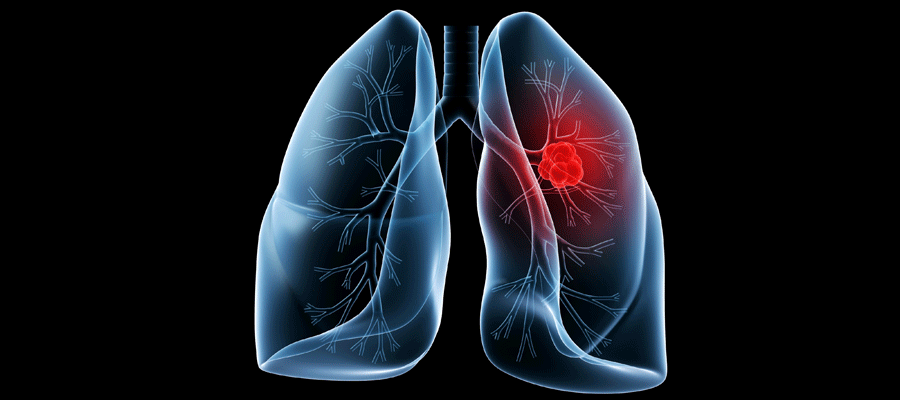Quality of life in lung cancer – EORTC brings the measurements up to date
24 Mar 2020
By Mary Rice, EORTC Communication consultant
In a paper1 published today (Tuesday 24 March) in The Lancet Oncology, researchers from 19 hospitals across 12 countries update the EORTC protocol for quality of life (QoL) in lung cancer patients, first published in 1994. The original lung cancer questionnaire module, EORTC QLQ-LC13, is the standard in the field and has now been used in hundreds of clinical studies.
Quality of life assessment is increasingly important in oncology, not just in order to help understand patients’ needs and responses to treatment, but also as a measure of the effectiveness of treatment. The advent of new and innovative therapies has meant that many of the old QoL measures are not adapted to cope with the new efficacy criteria or with new side effects.
“The situation has changed considerably since 1994,” says Professor Michael Koller, from the University Hospital Regensburg, Regensburg, Germany, who led the new study. “The promising new treatment options that have emerged in recent years, such as targeted therapy and immunotherapy, come with new efficacy criteria but also with new side effects. These include dizziness, splitting fingernails, and allergic reactions, among others. Furthermore, many of today’s patients are treated according to a multimodal regime that also includes thoracic surgery. The new QoL module also includes a surgical subscale that addresses these specific side effects, for example pain or sensitivity in the area of the wound.”
Between April 2016 and September 2018, 523 patients with a confirmed diagnosis of either non-small-cell lung cancer or small-cell lung cancer were recruited to the study. During a hospital visit, they were asked to fill in a QoL questionnaire. Half of them were then asked to fill in the same questionnaire two to four weeks later. “From these results, we were able to study the utility of the new questionnaire,” says Prof Koller.
Lung cancer generally has a poor prognosis, even though the five-year relative survival rate for all types of lung cancer has increased from 10.7% to 19.8% in the past four decades. This progress can be attributed to a number of factors including early detection, molecular characteristics, staging, surgery, radiotherapy, and systemic therapies. Given that a good QoL is a major goal of treatment, along with survival, it is clearly important that this can be quantified.
“Governments are starting to collect QoL data not only from cancer clinical trials, but also from patients undergoing standard hospital care. This can not only help health services understand patients’ needs, but also allow for QoL mapping across countries and perhaps even more widely”, says Dr Andrew Bottomley, EORTC Assistant Director and Head of the Quality of Life Department, a co-author of the study.
Recent research from the EORTC has shown that QoL can be important in predicting the outcome of disease; can be important in predicting the outcome of their disease, say researchers from the EORTC. Until recently, reports from clinicians on issues such as patient age and tumour status were used primarily in determining prognoses, but now researchers have shown conclusively that patient-reported outcomes (PROs) have considerable value in predicting survival. “This means that patients can be better able to adapt their lives to the impact of the cancer diagnosis on their survival” says Prof Koller.
“The most important thing now is that international clinical studies should apply the new updated QoL module and further demonstrate its performance in the real-life setting of trials.”
Michael Koller; Omar Shamieh; Marianne J Hjermstad; Kjersti Hornslien; Teresa Young; Tara Chalk; Georgios Ioannidis; Amelie Harle; Colin D Johnson; Krzysztof A Tomaszewski; Samantha Serpentini; Monica Pinto; Lotte van der Weijst; Annelies Janssens; Ofir Morag; Wei-Chu Chie; Juan I Arraras; Cecilia Pompili; Wolfgang Jungraithmayr; Marlene Hechtner; Despina Katsochi; Karolina Müller; Laura Gräfenstein; Christian Schulz; Andrew Bottomley; On behalf of the European Organisation for Research and Treatment of Cancer (EORTC) Quality of Life Group, EORTC Lung Cancer Group, and European Society of Thoracic Surgeons.
Related News
EORTC: Advancing research and treatment for rare cancers
29 Feb 2024
EORTC Fellowship Programme: celebrating more than 20 years of impactful collaboration
22 Feb 2024
Appointment of Malte Peters as EORTC Strategic Alliance Officer
9 Feb 2024
Unique series of workshops in partnership with the European Medicines Agency (EMA)
7 Feb 2024
EORTC launches a prominent clinical trial in older patients with locally advanced (LA) HNSCC (Head and Neck Squamous Cell Carcinoma)
14 Dec 2023
Seven IMMUcan abstracts selected for ESMO Immuno-Oncology Congress 2023
6 Dec 2023
EORTC Quality of Life measures integrated in CDISC
20 Nov 2023
EORTC and Immunocore are collaborating to launch the ATOM clinical trial of tebentafusp in Adjuvant Uveal Melanoma
7 Nov 2023
Treatment with decitabine resulted in a similar survival and fewer adverse events compared with conventional chemotherapy in older fit patients with acute myeloid leukaemia
31 Oct 2023
New results and forthcoming EORTC trials in rare cancers, lung, head and neck, and breast carcinomas presented at ESMO 2023
20 Oct 2023


